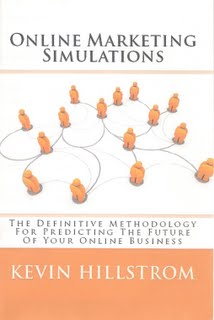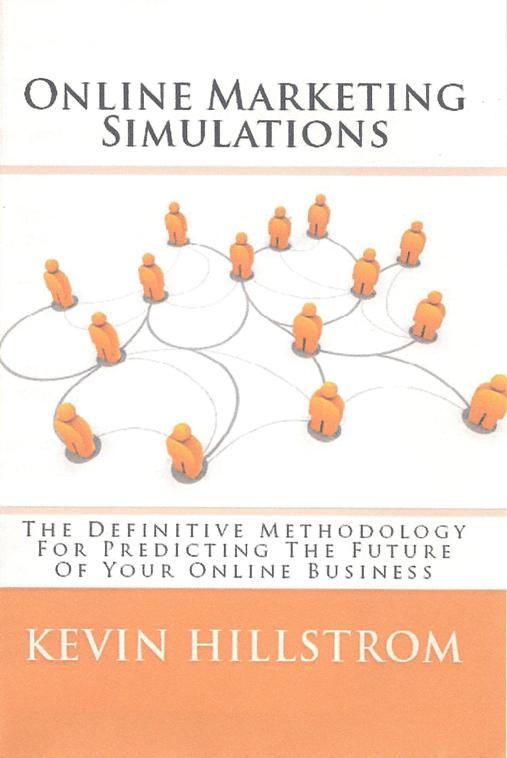Gliebers Dresses: Cyber Monday
Welcome to this week's Executive Meeting.
Glenn Glieber (Owner): "And honestly, this past week was the best sales week we've had in several years. Oh, it feels so good to actually celebrate for once."
Meredith Thompson (Chief Marketing Officer): "Kevin, is that you?"
Kevin: "Yup, it is me."
Lois Gladstone (Chief Financial Officer): "We're just celebrating our big Cyber Monday promotion, which helped contribute to one of the biggest sales weeks we've had in a half-decade."
Kevin: "Great! How did you do it?"
Roger Morgan (Chief Operations Officer): "Actually, it was my idea! We needed to do something to really stand out. So we implemented a radical promotion across all channels ... Free Shipping Plus 20% Off From Thanksgiving Through December 3, and Free Shipping Plus 35% Off On Cyber Monday."
Lois Gladstone: "And you should have seen how customers responded. The promotion went viral on Twitter. Sales were 40% better than last year on Cyber Monday. Now we're moving some inventory, folks!"
Kevin: "So Pepper, which customers took advantage of the promotion?"
Roger Morgan: "Who cares who took advantage of the promotion?"
Lois Gladstone: "Yeah, who cares?"
Pepper Morgan (Chief Marketing Officer): "Boris Feldman tells me that half of the customers were first time buyers ..."
Roger Morgan: "Yes!!! We introduced a large number of new customers to the brand!"
Pepper Morgan: "... and of the half that were existing customers, half were previously full-price customers who we converted to promotional buyers, half were previous promotional buyers."
Kevin: "Pepper, do promotional buyers purchase full-price merchandise in the future?"
Pepper Morgan: "Boris looked at this. Last year's Cyber Monday promotional buyers had a 19% repurchase rate, while all other customers had a 55% repurchase rate."
Kevin: "Did Gliebers Dresses make money on last year's Cyber Monday promotional buyers?"
Pepper Morgan: "Actually, no, we lost money, because those customers didn't respond to our marketing efforts. We spent catalog dollars and did not get a sufficient return on investment."
Lois Gladstone: "But this is a customer management issue, right? Let's just not market to Cyber Monday buyers. That way, we reap the benefits of our Cyber Monday promotion, we generate profit, and then who cares if the customer ever comes back, right? We don't ever have to mail catalogs to those discount-hungry shoppers. Let's just collect our $4 of profit and head home."
Roger Morgan: "Yes, who cares if the customer ever comes back?"
Meredith Thompson: "Well, I kinda care. The only reason we are in business is to profitably sell dresses, right?"
Lois Gladstone: "And you did that, Meredith. The average order value for a Cyber Monday promotional buyer was $120. Our gross margin is about 50%. So we generate $60 of margin, then we subtract $42 for the promotion, we subtract $14 to pick/pack/ship the item, and we're left with $4 of glorious profit. You moved merchandise, and you made $4 of profit per order, assuming items aren't returned."
Kevin: "What did Anna Carter do on Cyber Monday?"
Pepper Morgan: "They did not run a single promotion. Everything was at full price. This means that on a $120 order, they generated $60 of gross margin, offset by $14 of pick/pack/ship expense, and then they got shipping and handling revenue. They probably made $55 of profit per order."
Kevin: "This means that Gliebers Dresses has to generate fourteen orders for every one order that Anna Carter generated, in order to be more profitable than Anna Carter. Do you think that your business was fourteen times better than Anna Carter on Monday?"
Lois Gladstone: "We probably did three times as well as Anna Carter on Monday. That's huge!"
Roger Morgan: "But what about market share, Kevin? We absolutely dominated on Monday. We gained market share. That means something. That means we stole orders that would have gone to our competition. We hurt our competition on Monday, we put a dagger in their heart. Isn't market share worth something? I mean, everybody is contracting. On Cyber Monday, we grew. Neptune Research says that the companies that succeed in a recession are those who gain market share."
Kevin: "Sure it is worth something. But so is profit. Your business model was responsible for 3,000 orders at $4 profit per order, for a total of $12,000 profit. Anna Carter probably generated only 1,000 orders, at $55 profit per order, for a total of $55,000 profit. So, yes, you stole market share from Anna Carter. And Anna Carter has an additional $43,000 profit to invest in order entry systems or marketing activities or employee bonuses. Now, granted, maybe you stole 1,000 orders from Anna Carter, hurting them a bit, giving you an additional $4,000 profit. But if Boris is right, only 19% of Cyber Monday buyers repurchase, so you haven't impacted long-term market share, you just bought a bunch of orders for a few dollars of short-term profit. You haven't built something that is lasting. The entire history of Gliebers Dresses has been of a business model that was built to last. Now you are trying to prop-up a psuedo Holiday, and for what?"
Roger Morgan: "But what is wrong with that, Kevin? If we're more profitable for doing this, and Anna Carter is less profitable, then we won, right? I don't get it. Am I missing something? This is a simple profit and loss and marketshare game, and we won."
Kevin: "I don't think Gliebers Dresses is asking the right question. What would have happened if you offered 20% off plus free shipping? What would have happened if you offered 10% off plus free shipping? What would have happened if you only offered free shipping? What would have happened if you didn't offer a single promotion, like what Anna Carter did? Had you executed a multivariate test with different promotional levels as test cells, you could have known specifically which level of promotional activity yielded the best outcome. You reacted to the marketplace, competing not on profit, but on who can offer the most glorious promotion. You weren't selling dresses on Cyber Monday, you were selling the best promotion available. Customers will always, always be able to find a better promotion."
Roger Morgan: "You know what, Kevin, you're a downer. You are always telling us what we should be doing, always pointing out our flaws. You're a consultant, you aren't in the trenches with us. It is so easy for consultants to point out flaws. You go on Twitter and tell everybody what they should be doing. Who cares what pundits and gurus on Twitter think, they aren't running real businesses like we are. Down here, in the trenches, we're fighting for every order we get. We have to remain competitive, heck, everybody is out there on Cyber Monday giving away the house in order to keep customers. You try to sit in this room and explain to your Owner why we didn't run a promotion on Cyber Monday and generated only 1,000 orders instead of 3,000 orders. You then try to liquidate 2,000 orders worth of merchandise at a significant discount in January, completely cannibalizing your full-price business. Things aren't all cut and dried, like marketing pundits make them seem. As far as I am concerned, you can offer us some encouragement, or you can just keep quiet over there. I'm tired of being beat up by experts, I like being encouraged by research organizations who are promoting growth strategies."
Lois Gladstone: "Yeah Roger, I'm with you. It's one thing to offer pithy advice. It's another thing to be in the trenches, actually trying to keep a business afloat. You never supported our loyalty program, Kevin, you criticized us for giving away shipping and handling dollars there, too. What is your problem? Why do you hate promotions?"
Kevin: "I don't hate promotions. I fully support discounting and promotions when you have to clear inventory --- you cannot sit there and let inventory pile up. I get that. But, I am FAR more interested in the reason WHY promotions happen. Glenn, has the Monday after Thanksgiving always been one of the busiest days of the year at Gliebers Dresses?"
Glenn Glieber: "Ever since the 1980s, Kevin."
Kevin: "And when did you start offering discounts and promotions for Cyber Monday?"
Meredith Thompson: "We started offering Cyber Monday promotions in 2003."
Kevin: "And why did you start offering Cyber Monday promotions?"
Roger Morgan: "Woodside Research told us that Cyber Monday was a huge opportunity for online marketers to gain market share by offering promotions to eager holiday shoppers. They said that by 2005, 85% of online marketers would be offering sales and promotions to customers on Cyber Monday. And guess what, they were right."
Kevin: "So ever since the 1980s, this was a huge day. But in the last ten years, trade organizations and research organizations told you that you had to run your business in a different way, they told you that you had to offer discounts and promotions to lure bargain shoppers. Businesses listened. Now we have a big event that the media created and actively promotes ... they make money off of it via advertising, but at Gliebers Dresses, you compromise $55 of profit per order so that you can be competitive, competing for orders that generate $4 of profit. Basically, a combination of research organizations and media outlets hijacked one of the busiest days of the year for their own purposes, and you are left clawing for three times more orders than you would otherwise get, in theory, orders that generate 90% less profit. If pointing out this fact to you is a bad thing, then I'll gladly not participate in your meetings if you don't want me here. I am not going to come to these meetings and tell you a quaint bedtime story that makes you feel good. My job is to encourage you to think about the profitable decisions you make. And in the case of Cyber Monday, the logic doesn't support the level of discounting you've authored."
Lois Gladstone: "But this is the problem with your advice, Kevin. It doesn't matter that you think research organizations and trade organizations created this holiday. Now, everybody participates. We have no choice but to participate, or we lose out on market share and orders, we end up with an inventory problem."
Kevin: "You don't end up with an inventory problem if you don't give the store away and you plan for appropriate inventory levels nine months in advance. Anna Carter didn't participate in Cyber Monday. And by the way, did you get an iPod Touch for half-off at the Apple Store? Their store was absolutely crowded on Black Friday, and they don't discount. Did the iTunes store discount all digital music today in order to participate in Cyber Monday? Heck no!!! Go to Zappos, they aren't giving the store away, they just jack up the price of all items by $3, and then tell you that you are getting free shipping all day every day, end of story, and the public believes they are getting free shipping when they aren't. Discounts and promotions are taxes placed upon a brand for having unremarkable product, and they are unsustainable in the long-term. Honestly, how do you beat 2009 performance in 2010? Do you offer 40% off plus free shipping? And then how do you beat 2010 performance in 2011, do you offer 50% off plus free shipping? Where does it end?"
Lois Gladstone: "Kevin, that's stupid. Everybody knows you have to make profit on every order, so you'd never offer 50% off plus free shipping. We'll do what we have to do in order to remain competitive."
Glenn Glieber: "Well, Kevin, you certainly gave us an opportunity to reflect upon our actions. But I don't think we have much of a choice, we have to remain competitive. And honestly, I think Roger brings up something interesting to think about regarding your participation in these meetings. Enough for today, we need to move on to other topics. On Monday, we begin our inter-faith Holiday exposition in the lobby. Employees of all faiths are encouraged to decorate their designated area as appropriate for their Holiday belief system."
Labels: Cyber Monday, Fiction, Gliebers Dresses



